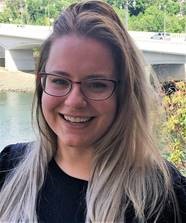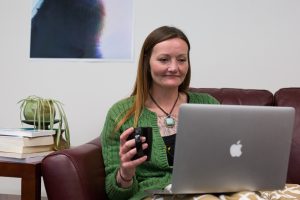As a military spouse, frequent moves were a way of life for Madison Mehalko. Stationed at military bases across the country, each move was met with uncertainty, leaving Mehalko questioning how long each stay would last. Although Mehalko carried a longtime interest in computer science, she postponed plans to enroll in college for fear that she would have to move again before she could earn a degree.

“Anytime we moved somewhere new, I couldn’t start a traditional education,” explains Mehalko. “Because it was unknown how long we were going to be here. Was it going to be a waste of money? Would any credits I earn transfer to a new college?”
After Mehalko and her husband were stationed in Washington State, she decided to take a chance and seek out a school that would work with her unique situation as a military spouse. Hoping to be more than just a number in a database, Mehalko searched for a supportive college environment that felt like a family.
“I started looking around at a couple of different schools and a couple of different programs that each school offered,” says Mehalko. “At South Puget Sound Community College, the values that the school held, were really what jumped out at me. They seemed very interested in the student, more so than a number. I wanted to learn from somebody who thought of me as family. So, I just jumped in, and they were there.”
Mehalko enrolled in classes that are part of SPSCC’s Information Technology pathway of study, working closely with faculty in the Computer Information Systems (CIS) department. Studying front and backend web design, Mehalko worked toward a degree in Computer Programming, currently called the Associate of Applied Science (AAS) degree in Software Development.

“Computer Information Systems, as a department, basically has two different areas that we focus in,” explains Randy Riness, a professor of computer programming at SPSCC. “One is getting people ready for on the job training. What we’re also trying to expand on, is supporting students that want to transfer to four-year universities.”
Students studying in a CIS program can pursue degrees like an AAS in Information Systems or an AAS in Software Development, which prepare students for employment right after graduation. These programs create a solid understanding of real-world computer science concepts and skills.
“The two-year AAS degrees are really practically focused,” says Riness. “Whether it’s in information systems or software development, we focus on giving students skills that they can walk into an employer and start being productive right off the bat. The programs are very sequential. We build on things, we pull pieces of multiple courses together so that by the end, you’ve got a really strong foundation and understand how the different parts interact.”
Additionally, an SPSCC student studying CIS can earn an applied degree in Software Development and / or Information Systems and then transfer to finish a Bachelor of Science degree from Western Governors University, The Evergreen State College, or an applied bachelor’s degree from another Washington community or technical college. A student can also choose Computer Science and then transfer to Saint Martin’s University, University of Washington, or Western Washington University. At SPSCC, transfer students develop critical computer skills while also building knowledge in subjects like math, physics, and logic.
A highlight for many SPSCC students is the flexibility and support available through the college. For Mehalko, SPSCC faculty and staff worked with her at every step, helping her to continue her education, even during times of personal hardship.

“I had a lot of medical things happening with not only me, but with my husband,” explains Mehalko. “He’s now retired out of the military, but, during the process when I was at SPSCC, I was going through a lot. And this was before telecommuting became so prominent like it is now. So, it was really awesome that the professors there were able to work with me while I wasn’t actually physically able to go to the school.”
In addition to building a solid foundation of computer science skills, SPSCC is also dedicated to helping students prepare for life after graduation. Connecting students with real-world opportunities, SPSCC invites potential employers on campus to speak with students and to join the Professional and Technical Advisory Committee, a group that helps shape computer science courses to meet industry needs.
Jason Selwitz, the dean of applied technology at SPSCC says that computer science graduates of SPSCC may be eligible for a range of private sector and government employment. “Information technology jobs in this region are in high demand,” he shares. “Graduates of the professional technical degrees, including information systems and software development, are going to be in high demand and they’re going to be able to fill positions with a real career trajectory.”

Now a graduate of SPSCC, Mehalko still maintains a role on the SPSCC advisory committee in addition to her full-time position as an engineer for an Olympia-based software development company. Crediting SPSCC for forging community and employer connections, Mehalko says SPSCC’s support helped her to achieve both her academic and career goals.
“I never would have found a job if it wasn’t for SPSCC,” says Mehalko. “They really did follow through with me. I graduated on a Saturday and I started my new career the following Monday. And you know, that was really facilitated by SPSCC. You have to be engaged in your education, but they are there for you if you are engaged.”
To learn more about the two CIS degree programs at SPSCC, visit the Information Systems and Software Development webpages.
Sponsored


















































